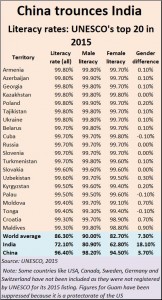http://www.freepressjournal.in/lessons-in-education-from-china-for-india/830650
What India can learn about education from China – I
Any way you look at it, there is a great sad irony underlining the approach of India and China to its own people and to the world.
India waxes eloquent about its being the fount of knowledge and education. It likes to take the high moral ground. It talks a lot about gender equality. Even about culture.
China speaks little, but its silence speaks volumes. It focusses on economic growth and has become one of the key growth engines for the world economy. As a result, it has witnessed a remarkable increase in per capita income, and a decline in poverty. In 1981, almost 85% of its population was poor. By 2008, this was brought down to 13.1% (poverty being defined as the number of people living on < $1.25/day http://www.globalissues.org/article/4/poverty-around-the-world#WorldBanksPovertyEste).
 China’s success in economic growth and in reducing poverty is well-known. But less is known about what it has done in the field of education.
China’s success in economic growth and in reducing poverty is well-known. But less is known about what it has done in the field of education.
Here too there is a great deal of irony. There was a time when Chinese scholars came to India to study. Today, it is largely Indians who go China to study. From being almost nowhere in global educational rankings, China is today one of the top 10 destinations for students around the world who seek higher education (http://www.theguardian.com/higher-education-network/blog/2014/jul/17/top-20-countries-international-students). And it continues to improve its ranking.
But this was possible because it never lost its focus on schools. This was quite unlike what Jawahar Lal Nehru, India’s first prime minister, did. Nehru liked to focus on big things. But he often overlooked the small, no matter how critically significant they were, whether by accident or design. He failed to increase the salaries of government employees, of policemen, even of judges. He forgot about schools and school teachers. Successive governments after him have continued with this folly.
They forget that school education is the biggest leveller in society, and can help propel backward communities to unbelievable heights. Education can provide more value-add to a backward community than any kind of reservation can. But reservation is an appealing political war cry. Studying in school requires more grit and governance. That could explain why India’s planners preferred the expedient over the pragmatic.
Consider how India scores in school education, compared with China (see chart). India is among the lowest-ranking countries when it comes to literacy. But, more shameful, it has the highest disparity between male and female literacy. Nothing could be a bigger slur on planning and social development.
What is even more shameful is that India’s literacy level is itself a dubious claim. India defines literacy as anyone who can read or write the letters of his or her name. Thus, if a girl is Sita, or Hema, and knows only those four letters, she would be considered literate. In reality, India’s literacy score should be a lot lower.
According to many studies, almost 70% of the students in Std VIII cannot do the sums or the writing and reading that bright Std III boys and girls can. Even at the graduate level, organisations like McKinseys and Nassom believe that barely 30% of the students are employable (http://asiaconverge.com/2016/04/iit-fees-hike-fix-institutes-essential-focus-foundation/).
The other problem is that Kapil Sibal, the former Union minister of education (ministry of Human Resource Development – or HRD) made matters worse. He steered through Parliament a legislation that made promotion for all classes upto VIII automatic and compulsory (http://asiaconverge.com/2010/05/sibals-kiss-of-death/). It is only now that the current HRD minister is trying to repeal those sections of the law which focus on automatic promotion (http://asiaconverge.com/2016/04/resurrection-class-tests-schools-improve-annual-filtering-students-needs-restored-urgently/). This is a good first step. But a lot more needs to be done.
Another problem with India is its reluctance to learn from third-party evaluation. When data is uncomfortable, India prefers to question the method of evaluation itself, rather than admit that corrective steps need to be taken. This is precisely what happened with the PISA (Programme for International Student Assessment) scores.
PISA is a worldwide study organised by the OECD in member for 15-year-old school pupils. It evaluates their scholastic performance on mathematics, science, and reading. It was first performed in 2000 and then repeated every three years. It is done with a view to improving education policies and outcomes.
Of the 74 countries tested in the PISA 2009 cycle, two Indian states (Himachal Pradesh and Tamil Nadu) came up 72nd and 73rd, in both reading and mathematics, and 73rd and 74th in science. India challenged the methodology used, claiming linguistic bias.
But the fact is that the Indian school system has been crumbling, year after year.
India finally decided to pull out of the 2012 round of PISA testing. In sheer contrast, Shanghai scored the highest in all the three subjects. It was followed by Singapore, Hong Kong (HK), Taiwan and Korea in Mathematics. Shanghai was followed by HK, Singapore, Japan and Korea in reading, and by HK Singapore, Japan and Finland in science.
In June 2013, India decided to stay away from the 2015 round of PISA testing as well.
Eventually, India’s planners need to understand that there is no way India will become a global power if it cannot get its school education right first. That means, upgrading standards. In turn that calls for upgrading teachers and facilities. It also means that gender disparity needs to be addressed. This cannot be done by fudging statistics or avoiding global benchmarking. India needs to look at the fundamentals first. Else it can kiss goodbye its dreams of becoming a developed nation.
Poor schooling eventually affects college education as well. And this is another area where China excels. Watch this space for more.





































COMMENTS